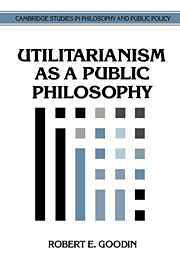Book contents
- Frontmatter
- Contents
- Preface
- Acknowledgments
- PART I INTRODUCTION: MORAL BASES OF STATE ACTION
- PART II MORALITY, PUBLIC AND PRIVATE
- PART III SHAPING PRIVATE CONDUCT
- PART IV SHAPING PUBLIC POLICIES
- 8 Liberalism and the best-judge principle
- 9 Laundering preferences
- 10 Heroic measures and false hopes
- 11 Theories of compensation
- 12 Stabilizing expectations
- 13 Compensation and redistribution
- 14 Basic income
- 15 Relative needs
- 16 What is so special about our fellow countrymen?
- 17 Nuclear disarmament as a moral certainty
- 18 International ethics and the environmental crisis
- References
- Name index
15 - Relative needs
Published online by Cambridge University Press: 28 January 2010
- Frontmatter
- Contents
- Preface
- Acknowledgments
- PART I INTRODUCTION: MORAL BASES OF STATE ACTION
- PART II MORALITY, PUBLIC AND PRIVATE
- PART III SHAPING PRIVATE CONDUCT
- PART IV SHAPING PUBLIC POLICIES
- 8 Liberalism and the best-judge principle
- 9 Laundering preferences
- 10 Heroic measures and false hopes
- 11 Theories of compensation
- 12 Stabilizing expectations
- 13 Compensation and redistribution
- 14 Basic income
- 15 Relative needs
- 16 What is so special about our fellow countrymen?
- 17 Nuclear disarmament as a moral certainty
- 18 International ethics and the environmental crisis
- References
- Name index
Summary
What conventionally follows in public policy terms from recognizing something as an unmet need is utterly uncontentious. It is standardly thought to be indisputably better for people to be provided with more of what they need, up to the point that they need no more of it. What follows from the proposition that there is a need for more housing? That we should build more of it, obviously. What follows from the proposition that there is a need for more education? That we should supply more of it, surely. What could be more straightforward?
It is the theme of this chapter that, perhaps surprisingly, maximizing the supply of needed resources is not always the right response to unmet need. At least for certain important classes of needed resources – and perhaps for most classes of needed resources, at least across certain portions of their ranges – the best way of meeting unmet needs may entail decreasing rather than increasing supply. More specifically, the best way of satisfying unmet needs may not be to cause those who are relatively more needy to have more of the needed resource, but rather to cause others to have less of it.
This chapter starts from two commonplaces about needs, their priority and their relativity. It proceeds to develop a paradox, arising principally out of the latter attribute but deriving much of its sting from the first.
- Type
- Chapter
- Information
- Utilitarianism as a Public Philosophy , pp. 244 - 262Publisher: Cambridge University PressPrint publication year: 1995



